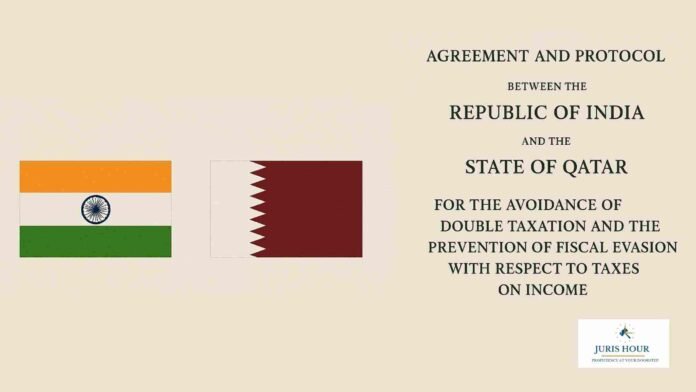The Government of India has formally notified the Agreement for the Avoidance of Double Taxation and the Prevention of Fiscal Evasion with respect to Taxes on Income between India and the State of Qatar. The agreement, signed on February 18, 2025, in New Delhi, came into force on October 10, 2025, following ratification by both nations.
The pact, published in the Gazette of India (Extraordinary), Part II, Section 3(i) by the Ministry of Finance (Department of Revenue), aims to eliminate double taxation on income earned in either country and curb tax evasion. It replaces earlier understandings and provides a comprehensive framework to promote economic cooperation, facilitate cross-border trade, and ensure fair taxation.
Key Provisions of the India-Qatar Double Taxation Avoidance Agreement
- Scope and Coverage
The treaty applies to residents of both India and Qatar concerning income taxes levied by either country, including taxes on income from immovable property, business profits, dividends, interest, royalties, and technical service fees.
- Definition of Residency
The agreement lays out clear rules to determine tax residency for individuals and entities, based on criteria such as domicile, place of management, and permanent establishment. Dual-residency conflicts will be resolved through mutual agreement between competent authorities.
- Permanent Establishment (PE)
A Permanent Establishment is defined as a fixed place of business through which an enterprise’s activities are wholly or partly carried out. It includes offices, branches, factories, workshops, and construction sites that exist for more than six months.
However, activities of a preparatory or auxiliary nature—like storage or purchasing—are excluded from PE status.
- Taxation of Business Profits
Profits of an enterprise of one country will be taxable only in that country unless the business operates in the other country through a PE. In such cases, only the income attributable to that PE may be taxed in the other country.
- Shipping and Air Transport
Profits derived from the operation of ships or aircraft in international traffic will be taxable only in the country where the enterprise is resident. This provision particularly benefits Qatar Airways and Indian carriers operating between the two countries.
- Associated Enterprises
The treaty adopts transfer pricing principles, allowing tax authorities to adjust profits between associated enterprises to reflect arm’s length transactions and prevent profit shifting.
- Dividends, Interest, and Royalties
Dividends: Withholding tax rates are capped at 5% if the beneficial owner holds at least 25% of the paying company’s shares, and 10% in other cases.
Interest and Royalties: Tax rates are limited to 10% of the gross amount, providing significant relief for cross-border investors and technology licensors.
- Technical Service Fees
Payments for managerial, technical, or consultancy services are also capped at 10%, unless effectively connected with a permanent establishment.
- Anti-abuse and Mutual Agreement Provisions
The agreement includes mechanisms to prevent treaty abuse and mandates cooperation between the tax authorities of both nations for information exchange and dispute resolution.
According to Article 30 of the Agreement, the provisions will apply in India, from the financial year immediately following the calendar year in which the treaty entered into force (i.e., FY 2026–27 onwards). In Qatar, for taxable years beginning after the same date.
India and Qatar enjoy strong economic ties, with bilateral trade exceeding USD 18 billion in 2024–25, primarily in energy, petrochemicals, and infrastructure sectors. The new agreement replaces earlier arrangements and aligns with India’s updated model tax treaty standards.
The India–Qatar Double Taxation Avoidance Agreement (DTAA) marks a milestone in India’s international tax diplomacy, offering dual benefits of avoiding double taxation and preventing fiscal evasion. By providing certainty and clarity in taxation matters, the pact is expected to further strengthen investment flows and deepen economic cooperation between the two nations.
Notification Details
Notification No. 154/2025
Date: 24/10/2025
Read More: ‘Pipeline Mixing of Fuels’ Not Manufacture: CESTAT Quashes Excise Duty Demand Against HPCL

